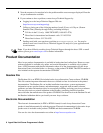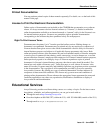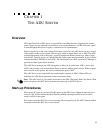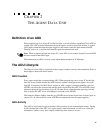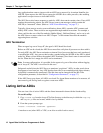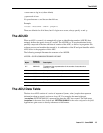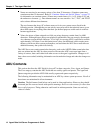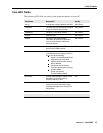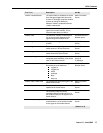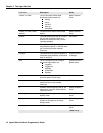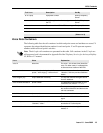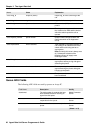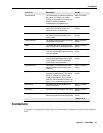
Chapter 2 The Agent Data Unit
14 Agent Data Unit Server Programmer’s Guide
Names are restricted to non-empty strings of less than 35 characters. (Container names may
contain more than 35 characters. Refer to “Container Names and Special Tokens,” on page 22
for information on container names.) Names may contain letters (a..z, A..Z), digits (0..9), and
the underscore character (_). Data element names are case sensitive: “foo”, “Foo”, and “FOO”
refer to three different data elements.
The set of names that Avaya IC software reserves for its own system use are listed in the
following section. Although they are not strictly reserved words in the technical sense, to use
these field names for anything other than their pre-defined purposes could result in conflicts
between applications.
Values, the pieces of data assigned to a field, are strings that may contain from 0 to 4096
characters. Although longer strings are technically permissible, they are strongly discouraged.
Any character except the null character (′\0′) is legal. An average ADU is expected to contain
approximately 100 values. It can hold many more values, but additional values require more
memory, which can affect system performance, and each time the ADU Server must allocate
additional memory the system slows briefly.
The ADU Server sets certain name/value data pairs, such as the ADUID. Other name/value data
pairs are written into the ADU by other processes. Because the ADU can accept input from a
variety of sources, data could come from other servers or the agent's application. Changes to all
data values are recorded, including information on who made the change and when the change was
made.
ADU Contents
This section describes the ADU fields for Avaya IC in three categories: Core, Agent, and Queue.
The Core category contains the ADU fields that are used by agents and queues. The Agent and
Queue categories provide the ADU fields used by agents and queues respectively.
The following information may be maintained in an ADU by various system processes. Not all of
these items are maintained in all environments.
Caution: The field names listed below can be used in client applications. However, they should
be treated just like reserved words with specific meanings. Do not use these names for other than
these explicit purposes! Doing otherwise could result in misinterpretation. Some are read-only
values to clients.
!



